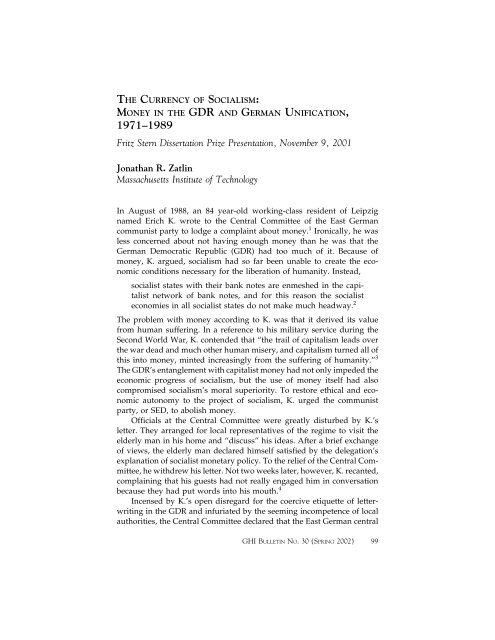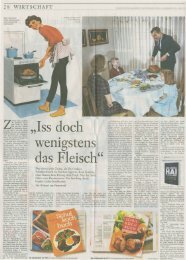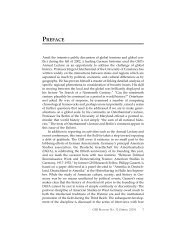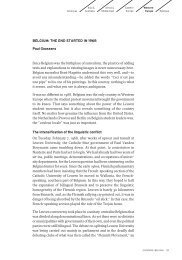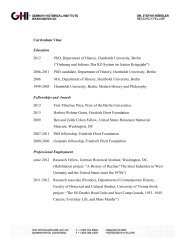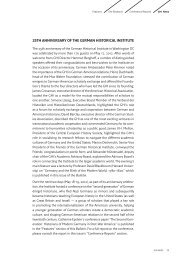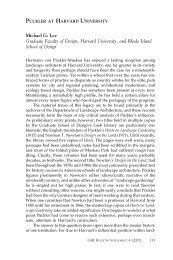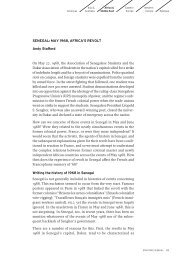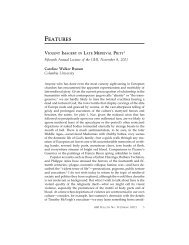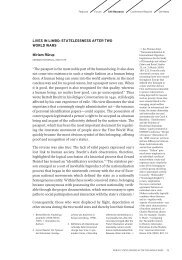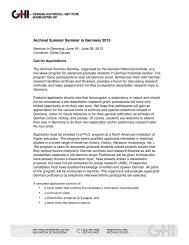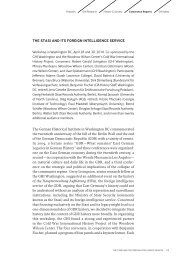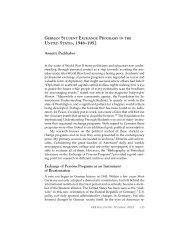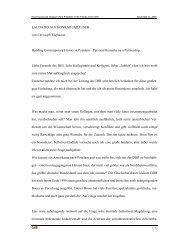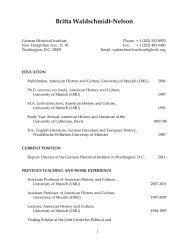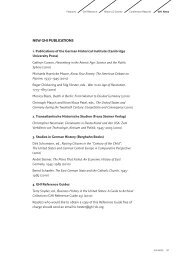The Currency of Socialism - German Historical Institute Washington ...
The Currency of Socialism - German Historical Institute Washington ...
The Currency of Socialism - German Historical Institute Washington ...
Create successful ePaper yourself
Turn your PDF publications into a flip-book with our unique Google optimized e-Paper software.
THE CURRENCY OF SOCIALISM:<br />
MONEY IN THE GDR AND GERMAN UNIFICATION,<br />
1971–1989<br />
Fritz Stern Dissertation Prize Presentation, November 9, 2001<br />
Jonathan R. Zatlin<br />
Massachusetts <strong>Institute</strong> <strong>of</strong> Technology<br />
In August <strong>of</strong> 1988, an 84 year-old working-class resident <strong>of</strong> Leipzig<br />
named Erich K. wrote to the Central Committee <strong>of</strong> the East <strong>German</strong><br />
communist party to lodge a complaint about money. 1 Ironically, he was<br />
less concerned about not having enough money than he was that the<br />
<strong>German</strong> Democratic Republic (GDR) had too much <strong>of</strong> it. Because <strong>of</strong><br />
money, K. argued, socialism had so far been unable to create the economic<br />
conditions necessary for the liberation <strong>of</strong> humanity. Instead,<br />
socialist states with their bank notes are enmeshed in the capitalist<br />
network <strong>of</strong> bank notes, and for this reason the socialist<br />
economies in all socialist states do not make much headway. 2<br />
<strong>The</strong> problem with money according to K. was that it derived its value<br />
from human suffering. In a reference to his military service during the<br />
Second World War, K. contended that “the trail <strong>of</strong> capitalism leads over<br />
the war dead and much other human misery, and capitalism turned all <strong>of</strong><br />
this into money, minted increasingly from the suffering <strong>of</strong> humanity.” 3<br />
<strong>The</strong> GDR’s entanglement with capitalist money had not only impeded the<br />
economic progress <strong>of</strong> socialism, but the use <strong>of</strong> money itself had also<br />
compromised socialism’s moral superiority. To restore ethical and economic<br />
autonomy to the project <strong>of</strong> socialism, K. urged the communist<br />
party, or SED, to abolish money.<br />
Officials at the Central Committee were greatly disturbed by K.’s<br />
letter. <strong>The</strong>y arranged for local representatives <strong>of</strong> the regime to visit the<br />
elderly man in his home and “discuss” his ideas. After a brief exchange<br />
<strong>of</strong> views, the elderly man declared himself satisfied by the delegation’s<br />
explanation <strong>of</strong> socialist monetary policy. To the relief <strong>of</strong> the Central Committee,<br />
he withdrew his letter. Not two weeks later, however, K. recanted,<br />
complaining that his guests had not really engaged him in conversation<br />
because they had put words into his mouth. 4<br />
Incensed by K.’s open disregard for the coercive etiquette <strong>of</strong> letterwriting<br />
in the GDR and infuriated by the seeming incompetence <strong>of</strong> local<br />
authorities, the Central Committee declared that the East <strong>German</strong> central<br />
GHI BULLETIN NO. 30(SPRING 2002) 99
ank was responsible for the fiasco. In a scathing letter, the Central Committee<br />
charged that the bank was unable to control the circulation <strong>of</strong> ideas<br />
in the area <strong>of</strong> its own expertise, the circulation <strong>of</strong> money. <strong>The</strong> Central<br />
Committee then demanded that Gerhard Serick, Deputy President <strong>of</strong> the<br />
bank, coerce K. into rescinding the retraction <strong>of</strong> his withdrawal. 5<br />
Faced on the one hand with intense political pressure from the SED<br />
leadership to silence K. and an avalanche <strong>of</strong> cantankerous letters from the<br />
elderly man on the other, Serick tried to depoliticize the affair by attributing<br />
K.’s recalcitrance to his advanced age. Noting that his ideas were<br />
“totally confused and ludicrous,” Serick suggested that K. was simply<br />
senile. 6<br />
But even if K. were merely muddled and ornery, he had succeeded in<br />
agitating the communist party leadership with his suggestion that a pr<strong>of</strong>ound<br />
discrepancy between theory and praxis existed in the GDR. Not<br />
only had K. pointed out that the party had yet to implement its egalitarian<br />
promise <strong>of</strong> a moneyless society, but he had also disclosed the extent to<br />
which the GDR was indebted to its capitalist enemies.<br />
As K.’s case implied, the SED sought to encourage the formation <strong>of</strong><br />
ideological allegiances through economic practice, but its attempt to govern<br />
an industrial—and divided—nation by force had instead fostered the<br />
creation <strong>of</strong> political allegiances through money. <strong>The</strong> East <strong>German</strong> mark,<br />
the SED hoped, would displace capitalist money and mores, untangle the<br />
moral inversions <strong>of</strong> capitalist logic, and distribute social justice in the<br />
place <strong>of</strong> social alienation. Yet, the intellectual debt <strong>of</strong> Marxism-Leninism<br />
to liberal economic theory ensured the planned economy’s inability to<br />
function without recourse to capitalist media <strong>of</strong> exchange. <strong>The</strong> regime<br />
supplemented its authoritarian and inefficient economy through the market,<br />
importing western technology and establishing the Intershops, or<br />
hard-currency stores. In the end, the party’s contradictory response to<br />
the consumer desire manufactured by the East <strong>German</strong> industrial<br />
base consisted <strong>of</strong> abjuring the West <strong>German</strong> economic model while simultaneously<br />
promoting the circulation <strong>of</strong> West <strong>German</strong> money and<br />
merchandise.<br />
K.’s portrayal <strong>of</strong> money as a source <strong>of</strong> social injustice resonated<br />
strongly with East <strong>German</strong> Marxist-Leninists, who agreed that money<br />
could have no place in the future <strong>of</strong> the socialist state. To some extent,<br />
their mistrust <strong>of</strong> money had been shaped by the peculiarities <strong>of</strong> <strong>German</strong><br />
economic history. <strong>The</strong> traumatic experiences <strong>of</strong> the hyperinflation during<br />
1923, when <strong>German</strong>s had too much money, and the radical deflation <strong>of</strong><br />
the Great Depression, when they had too little, turned a majority <strong>of</strong><br />
<strong>German</strong>s away from liberal solutions to the challenges <strong>of</strong> modernity. 7<br />
After World War II, the return <strong>of</strong> inflation heightened the determination<br />
<strong>of</strong> many <strong>German</strong>s to organize economic activity according to the prin-<br />
100 GHI BULLETIN NO. 30(SPRING 2002)
ciple <strong>of</strong> social justice. <strong>The</strong> role <strong>of</strong> money as a causal factor in <strong>German</strong><br />
history took on new meaning in 1948, however, when the Deutsche Mark<br />
replaced the Reichsmark in the western zone <strong>of</strong> occupation and precipitated<br />
the partition <strong>of</strong> <strong>German</strong>y into a capitalist West and a communist<br />
East. 8 For forty years, the two <strong>German</strong> states sought to link national<br />
identity with economic organization—the social market economy in the<br />
Federal Republic, and central planning in the GDR. 9 In 1989/90, the<br />
systemic competition between capitalism and communism would once<br />
again thrust money into center stage, as East <strong>German</strong> demand for West<br />
<strong>German</strong> marks paved the way for <strong>German</strong>-<strong>German</strong> reconciliation after<br />
the collapse <strong>of</strong> the Berlin Wall. 10 For the first time in <strong>German</strong> history,<br />
money played a unifying, rather than a divisive, role. In the meantime,<br />
however, K. and millions <strong>of</strong> other <strong>German</strong>s like him experienced money<br />
as a medium for creating social stratification. 11<br />
In addition to this peculiarly <strong>German</strong> equation <strong>of</strong> money with social<br />
inequality, the East <strong>German</strong> communist party had inherited an ideological<br />
antipathy towards money from the Soviet Union. Like other Marxist-<br />
Leninist parties, the SED staked its claim to power on a scientistic critique<br />
<strong>of</strong> capitalism that understood money as the locus <strong>of</strong> social alienation. <strong>The</strong><br />
production methods specific to capitalism entail the subordination <strong>of</strong><br />
ethical to economic values, which finds its clearest expression in the pr<strong>of</strong>it<br />
motive. This elevation <strong>of</strong> the market over morality, <strong>of</strong>ten justified by the<br />
liberal equation <strong>of</strong> private vice with public virtue, results in a pr<strong>of</strong>ound<br />
inversion <strong>of</strong> means and ends, where the purpose <strong>of</strong> human economic<br />
production—the sustenance <strong>of</strong> life—is confused with the instrument we<br />
employ to sustain that life—the pursuit <strong>of</strong> money. We end up living to<br />
work, rather than working to live. In addition, the production relations<br />
specific to capitalism lead to a form <strong>of</strong> alienation that Karl Marx termed<br />
commodity fetishism, or the false attribution to inanimate objects <strong>of</strong> the<br />
power to gratify human needs. According to Marx, money is the quintessential<br />
commodity fetish because it<br />
debases all the gods <strong>of</strong> man and turns them into commodities.<br />
Money is the universal, self-constituting value <strong>of</strong> all things. It has<br />
therefore robbed the whole world, human as well as natural, <strong>of</strong><br />
its own values. 12<br />
Based on these insights into the workings <strong>of</strong> capitalism, the SED sought<br />
to distinguish between “real” and “false” needs. “Real” needs, whether <strong>of</strong><br />
a physical or spiritual nature, are generated by the material conditions <strong>of</strong><br />
a given society in history. 13 In contrast, “destructive, parasitical, and false<br />
(illusory) needs” consist <strong>of</strong> “needs [that] are deformed, manipulated, and<br />
in part artificially manufactured to suggest illusions to working people<br />
about their real situation in society.” 14<br />
GHI BULLETIN NO. 30(SPRING 2002) 101
Through this dichotomy, the SED established an equivalency between<br />
false needs and commodity fetishism, between desire and money.<br />
<strong>The</strong> planned economy, or so the SED alleged, is superior to capitalism<br />
because it removes the grounds for desire by creating social conditions in<br />
which only real needs exist. As the medium for the satisfaction <strong>of</strong> real<br />
needs, socialist money <strong>of</strong>fers the opportunity to apportion the wealth <strong>of</strong><br />
society along egalitarian lines. 15<br />
Making money worth less, however, was not the same as making it<br />
worthless. <strong>The</strong> social construction <strong>of</strong> value in the GDR was mediated not<br />
by a utopian transparency <strong>of</strong> needs, but by shortages <strong>of</strong> economic and<br />
ethical goods. <strong>The</strong> replacement <strong>of</strong> money with planning indicators did<br />
permit the party to emphasize its production priorities. <strong>The</strong> system <strong>of</strong><br />
apportioning resources from the center, however, led to the uneven distribution<br />
and waste <strong>of</strong> resources. Freed from the threat <strong>of</strong> bankruptcy,<br />
East <strong>German</strong> factories were no longer guided by cost constraints. Ignoring<br />
costs, however, permitted inefficiencies that were eventually to overwhelm<br />
the productive capacities <strong>of</strong> the East <strong>German</strong> economy.<br />
For consumers, the waste and inefficiency in the planned economy<br />
<strong>of</strong>ten expressed itself as a problem <strong>of</strong> complementarity, or the reliance <strong>of</strong><br />
one commodity on another in order for it to function. 16 To give just one<br />
example, in the summer <strong>of</strong> 1979, East <strong>German</strong>s experienced a severe<br />
shortage <strong>of</strong> ketchup, a scarce and highly desirable commodity. 17 <strong>The</strong><br />
shortage <strong>of</strong> ketchup induced consumers to shift to mustard as a substitute.<br />
<strong>The</strong> mustard plan for 1980, however, had not anticipated such an<br />
increase in demand. <strong>The</strong> responsible factory had no difficulty producing<br />
the extra mustard, but discovered that it did not have enough jars in<br />
which to put the mustard. <strong>The</strong> production bottleneck created a minor<br />
political crisis, as East <strong>German</strong>s were forced to eat without the aid <strong>of</strong><br />
condiments. By April <strong>of</strong> 1980, the Politburo found it necessary to intervene<br />
by conscripting a glass factory to take up the slack in production.<br />
<strong>The</strong> glass factory had no problems meeting this revision in its plan and<br />
was able to produce several million containers. It did so, however, only<br />
by ignoring another task: producing marmalade jars.<br />
<strong>The</strong> chronic shortages <strong>of</strong> consumer goods afflicting the planned<br />
economy undermined the value <strong>of</strong> socialist money. Although the East<br />
<strong>German</strong> mark sufficed to complete purchases <strong>of</strong> the basic necessities <strong>of</strong><br />
life, such as bread and the rent, it could not overcome shortages or the<br />
un<strong>of</strong>ficial forms <strong>of</strong> rationing typical <strong>of</strong> the planned economy, such as<br />
exceedingly long lines and black markets. To ensure the prompt delivery<br />
<strong>of</strong> washing machines, to reduce the long wait for cars, or simply to<br />
purchase good c<strong>of</strong>fee or stockings, West <strong>German</strong> money played a prominent<br />
role. As a result, the GDR’s monetary regime fragmented into two<br />
competing modes <strong>of</strong> exchange. Socialist money was used to satisfy “real”<br />
102 GHI BULLETIN NO. 30(SPRING 2002)
needs, but only capitalist money could fulfil the desires <strong>of</strong> East <strong>German</strong><br />
consumers.<br />
As the elderly K. had noted, the GDR’s entanglement with capitalist<br />
money seriously undermined socialism’s political legitimacy. With the<br />
assumption <strong>of</strong> power by Erich Honecker in 1971, the GDR’s reliance on<br />
the West to solve its economic problems increased dramatically. In order<br />
to curry favor with the populace and consolidate his power, Honecker<br />
launched a new economic policy aimed at shifting more resources to meet<br />
consumer demand.<br />
Yet, political coercion and the pace <strong>of</strong> technological innovation under<br />
socialism rendered sustained economic growth impossible. <strong>The</strong> GDR was<br />
in no position to boost production <strong>of</strong> consumer durable goods. What little<br />
improvement in living standards Honecker did achieve came at the expense<br />
<strong>of</strong> long-term investment in the GDR’s industrial base. By the late<br />
1980s, the East <strong>German</strong> infrastructure had thoroughly deteriorated. In<br />
1989, for example, 75 percent <strong>of</strong> all equipment in the East <strong>German</strong> manufacturing,<br />
mining, and energy sectors was more than 20 years old. 18 In<br />
1988, moreover, the Workers and Peasants Inspectorate, which was responsible<br />
for monitoring the state apparatus, reported that nearly half <strong>of</strong><br />
the warehouses in the GDR had holes in the ro<strong>of</strong> through which rain<br />
could drip onto food, consumer goods, and machinery. 19<br />
By the mid-1980s, the maintenance <strong>of</strong> public space had deteriorated<br />
so much that the Workers and Peasants Inspectorate felt impelled to<br />
investigate the state <strong>of</strong> sanitation in the GDR. After checking the toilets in<br />
over 10,000 stores and 6,000 restaurants, they classified more than half as<br />
substandard, the worst <strong>of</strong> which involved restaurant facilities from which<br />
fecal matter had not been removed for years. 20<br />
By authorizing increases in the supply <strong>of</strong> consumer goods without a<br />
parallel increase in the productivity necessary to fund them, Honecker<br />
overextended the regime’s productive capacities, driving the GDR deeply<br />
into debt with the West. In 1970, the year before Honecker’s takeover, the<br />
GDR’s foreign debt had risen to a record $1 billion. Just ten years later,<br />
however, the debt jumped to $11 billion, and would soar to $21 billion by<br />
1989. 21<br />
As the GDR’s debt to the West began to surge, the party concocted a<br />
variety <strong>of</strong> schemes aimed at reducing imports. Some <strong>of</strong> the GDR’s importreduction<br />
strategies illustrate the more ridiculous aspects <strong>of</strong> the proscriptive<br />
abstinence inherent in Marxist-Leninist consumer ideology, such as<br />
the attempt by economic planners in 1977 to eliminate c<strong>of</strong>fee. In support<br />
<strong>of</strong> his plan, the State Planning Commissioner declared that “the Planning<br />
Commission has not been drinking c<strong>of</strong>fee for a long time, and it’s all<br />
right, we’re still alive”—as if the rest <strong>of</strong> the population would be as eager<br />
to forego such simple pleasures. 22 GHI BULLETIN NO. 30(SPRING 2002) 103
<strong>The</strong> planning apparatus also embarked on misguided attempts to<br />
engineer substitutes for imported items. In 1980, for example, East <strong>German</strong><br />
scientists patented a method for candying unripe tomatoes as a<br />
sugar ersatz. <strong>The</strong>y estimated that the process would save the GDR 3<br />
million West <strong>German</strong> marks annually. <strong>The</strong> only problem was that East<br />
<strong>German</strong>y had neither the facilities adequate to store the green tomatoes<br />
during the fermentation process nor the machines necessary to produce<br />
the sugar substitute—not to mention serious questions about the surrogate<br />
sugar’s taste. 23 More effective, if rather desperate, were plans to sell<br />
<strong>of</strong>f the GDR’s gold reserves, weapons stockpiles, and even its cultural<br />
treasures, from works <strong>of</strong> art to cobblestones. 24 <strong>The</strong> GDR also put a price<br />
on its education system, advertising its willingness to train students who<br />
had been rejected from western medical schools in return for hard currency.<br />
25<br />
Eventually, the corrupting influence <strong>of</strong> fiscal necessity colonized areas<br />
<strong>of</strong> life <strong>of</strong>ficially considered ethically sacrosanct, such as health care. In<br />
1988, for example, the GDR agreed to permit Hoechst, one <strong>of</strong> the largest<br />
West <strong>German</strong> pharmaceutical companies, to conduct tests <strong>of</strong> a new medication<br />
for high blood pressure. 26 Because West <strong>German</strong> authorities believed<br />
these tests posed a danger to human life, Hoechst had been prevented<br />
from testing the drug in the Federal Republic. Given the shared<br />
language and institutional history, the excellent medical training <strong>of</strong> East<br />
<strong>German</strong> physicians, and the SED leadership’s willingness to overlook<br />
moral reservations, the GDR provided a perfect testing ground for lifethreatening<br />
drug studies. In return, Hoechst agreed to pay 500,000 West<br />
<strong>German</strong> marks.<br />
<strong>The</strong> hitch was that Hoechst wanted to use patients in an already<br />
advanced stage <strong>of</strong> illness for a double-blind study in which half the<br />
patients would receive a placebo. <strong>The</strong> risks were serious, as one concerned<br />
member <strong>of</strong> the East <strong>German</strong> medical community pointed out.<br />
Worried that “the contract will . . . be based on a one-sided consideration<br />
<strong>of</strong> money,” he sought assistance from the secret police against the Ministry<br />
<strong>of</strong> Health and the economic apparatus. <strong>The</strong> Stasi agreed to help<br />
prevent the tests—less because <strong>of</strong> the ethical questions raised by the<br />
study than for security reasons. If news <strong>of</strong> the test was leaked, the Stasi<br />
reasoned, it could “be used for negative political activities against the<br />
GDR, including blackmail.” This incident and others like it complicate<br />
arguments that seek to reduce the life <strong>of</strong> the GDR to the coercive excesses<br />
<strong>of</strong> its secret police. 27 As I try to demonstrate in my dissertation, representatives<br />
<strong>of</strong> the SED’s economic apparatus were capable <strong>of</strong> an even<br />
greater disregard for human life in the pursuit <strong>of</strong> money than the most<br />
cynical Stasi <strong>of</strong>ficers.<br />
104 GHI BULLETIN NO. 30(SPRING 2002)
By far the most important source <strong>of</strong> hard currency, however, was the<br />
Intershops. 28 Much like the Soviet Beriozka, the Czechoslovak Tuzex, the<br />
Polish Pewex, and the Bulgarian Corecom, the East <strong>German</strong> Intershops<br />
were initially designed to <strong>of</strong>fer inexpensive Western goods exclusively to<br />
Western tourists as a way <strong>of</strong> supplementing the GDR’s hard-currency<br />
receipts. <strong>The</strong>se similarities ended in 1971, when Honecker embarked on<br />
an aggressive expansion <strong>of</strong> the Intershops, not only increasing their number<br />
but also opening them to East <strong>German</strong> citizens for the first time.<br />
<strong>The</strong> economic decision to expand the sphere <strong>of</strong> Intershop activities<br />
was reinforced throughout the 1970s by Honecker’s political decision to<br />
respond positively to the overtures <strong>of</strong> detente. <strong>The</strong> liberalization <strong>of</strong> travel<br />
arrangements between the two <strong>German</strong>ies made it feasible for large numbers<br />
<strong>of</strong> West <strong>German</strong>s to travel to the GDR for the first time since the<br />
Berlin Wall went up. Naturally, West <strong>German</strong> visitors brought with them<br />
West <strong>German</strong> currency, increasing the circulation <strong>of</strong> West <strong>German</strong> marks<br />
in East <strong>German</strong> hands. Gifts from family and friends constituted the main<br />
source <strong>of</strong> western currency. <strong>The</strong> result was a flourishing illegal market for<br />
goods and services in return for West <strong>German</strong> marks.<br />
Trade on the black market had always represented a challenge to the<br />
party’s power because it took place beyond the purview <strong>of</strong> the plan and<br />
embodied an alternate system <strong>of</strong> values in competition with the planned<br />
economy. To reduce the scope <strong>of</strong> black market trade, the party moved it<br />
inside the Intershops, which opened their doors to East <strong>German</strong>s in 1974.<br />
<strong>The</strong> result was a sharp increase in the GDR’s intake <strong>of</strong> hard currency,<br />
soaring from 170 million West <strong>German</strong> marks in 1971 to 1.2 billion in the<br />
revolutionary year <strong>of</strong> 1989. 29<br />
Officially sanctioning the use <strong>of</strong> Western currency, however, did little<br />
to make the West <strong>German</strong> mark less attractive. Instead <strong>of</strong> reducing the<br />
presence <strong>of</strong> Western money and all that it symbolized, the Intershops<br />
only made the extent <strong>of</strong> its circulation more apparent. <strong>The</strong> gradual depreciation<br />
<strong>of</strong> the East <strong>German</strong> mark, moreover, took on a political dimension<br />
once the regime gave its <strong>of</strong>ficial blessing to a two-currency economy,<br />
in much the same way that the party leadership’s public preference for<br />
Volvos devalued the domestic automobile industry.<br />
In addition, conceding the Intershops such a large role in the retail<br />
sector encouraged the very social stratification based on commodity fetishism<br />
that the SED was nominally devoted to eradicating. Most <strong>of</strong> those<br />
blessed with West <strong>German</strong> money owed their access to it to ties <strong>of</strong> family<br />
or friendship—which automatically excluded most party members, who<br />
were obliged to cut <strong>of</strong>f all contact with the Federal Republic. Rather than<br />
rewarding people loyal to the regime, then, or improving the position <strong>of</strong><br />
the working class, the Intershop system privileged the very people whose<br />
sympathy for the GDR was most likely to be the least enthusiastic.<br />
GHI BULLETIN NO. 30(SPRING 2002) 105
Yet, the social value <strong>of</strong> West <strong>German</strong> money was not restricted to the<br />
ability to purchase high-quality commodities, or even the prestige attached<br />
to these products because <strong>of</strong> their scarcity or western origin.<br />
Rather, the West <strong>German</strong> mark was imbued with the nimbus <strong>of</strong> an alternative<br />
value system in direct competition—ideologically and monetarily—with<br />
the GDR. For this reason, <strong>of</strong>ficial sanction <strong>of</strong> trade denominated<br />
in hard currency was tantamount to legitimizing capitalist<br />
relations, leading to an increased orientation towards western consumer<br />
goods and a serious threat to the GDR’s currency. Ironically, the SED’s<br />
own economic practices were eroding the ethical and financial ground on<br />
which socialism stood.<br />
For their part, East <strong>German</strong>s who had no access to hard currency<br />
sought to appeal to the regime’s egalitarian sensibilities against the Intershops,<br />
flooding the regime with letters <strong>of</strong> complaint. One woman, for<br />
example, charged that<br />
the GDR is a socialist state, in which the privileges <strong>of</strong> certain<br />
people should be abolished. That is why I am indignant about the<br />
Intershops in this country. 30<br />
Many letters written to party <strong>of</strong>ficials, however, journeyed on to the<br />
next logical step. <strong>The</strong>y inverted the relation between egalitarian ideology<br />
and divisive practice, demanding uniform access to West <strong>German</strong> money,<br />
and the Intershops along with it, as a right that should be accorded<br />
everyone in keeping with the regime’s advocacy <strong>of</strong> social equality. Another<br />
woman wrote Honecker to demand that “in the future, West <strong>German</strong><br />
marks are to be part <strong>of</strong> monthly salaries” so that everyone might<br />
have the opportunity to shop in the hard-currency stores. 31 In another<br />
curious reversal, many East <strong>German</strong>s linked moral probity to Western<br />
money. One man, for example, denounced<br />
the corruption and fraud blossoming in all walks <strong>of</strong> life. As a<br />
Christian, I don’t want to be involved in this. <strong>The</strong> only way to<br />
remain honest is to obtain West <strong>German</strong> marks. That’s why I<br />
would like to apply for 50 percent <strong>of</strong> my salary to be paid out in<br />
West <strong>German</strong> marks. 32<br />
Clearly, the population was increasingly inclined to link economic performance,<br />
as measured by the supply <strong>of</strong> Western currency, to questions<br />
<strong>of</strong> political power.<br />
What began as an attempt to modernize the retail sector in order to<br />
consolidate the rule <strong>of</strong> a new political leadership ended up intensifying<br />
the contradictions inherent in the GDR’s approach to consumer sovereignty.<br />
Although expanding the Intershop retail chain helped ease the<br />
financial crisis brought about by Honecker’s policies, it also unleashed<br />
106 GHI BULLETIN NO. 30(SPRING 2002)
the demons <strong>of</strong> Western consumerism and national division, deepening<br />
social stratifications that could not be explained away by Marxist-Leninist<br />
ideology. East <strong>German</strong>s were tantalized by the glimpse <strong>of</strong> Western consumerism<br />
provided by the Intershops, which functioned as enclaves <strong>of</strong><br />
capitalism on socialist soil, yet they were frustrated by the unequal access<br />
to it.<br />
In fact, the division between the Intershops and the black market,<br />
between the East and West <strong>German</strong> mark, and between socialism and<br />
capitalism reinforced a growing split in the planned economy. <strong>The</strong> SED<br />
was unable to reconcile its ideological aspirations—a society free <strong>of</strong> the<br />
social alienation represented by capitalist money and merchandise—with<br />
the practical exigencies <strong>of</strong> governing an industrial society by force. <strong>The</strong><br />
party attempted to manage the needs <strong>of</strong> socialist consumers by turning to<br />
the West, but this policy introduced currency and commodities that had<br />
been produced according to a system <strong>of</strong> valuation that was antithetical to<br />
socialism. Worse, the appearance <strong>of</strong> new and high-quality goods on the<br />
East <strong>German</strong> market, combined with the <strong>of</strong>ficially sanctioned method <strong>of</strong><br />
distributing them via access to West <strong>German</strong> currency, only engendered<br />
the very same commodity fetishism that the SED publicly vituperated.<br />
<strong>The</strong> SED’s attempt to control what money can buy, as well as what<br />
purchase it has on human imagination, failed. By 1989, the party’s preference<br />
for financial expediency over ideological consistency had consumed<br />
both the GDR’s economic strength and its political legitimacy, as<br />
some East <strong>German</strong>s were permitted to consume what they could <strong>of</strong> the<br />
West, while the others were left with nothing to consume but the ideology<br />
itself.<br />
Notes<br />
1 <strong>The</strong> Federal Archives granted access to this and other petitions on the condition that the<br />
privacy <strong>of</strong> East <strong>German</strong> citizens who wrote letters is preserved.<br />
2 <strong>The</strong> <strong>German</strong>, replete with idiosyncratic spellings, runs: “Die sozialismuslichen Staaten<br />
sind mit ihren Banknoten mit in das kapitalistische Banknotennetz mit hinein verstrickt und<br />
darum kommt die sozialische Wirtschaft in allen sozialischen Staaten nicht so richtig voran”<br />
(Bundesarchiv Berlin (BarchB), DN10 3287, petition from 23.8.88 to the ZK, p.1).<br />
3 Ibid. See also BArchB, DN10 3287, K. to SED, 10.11.85, and K. to Honecker, 20.6.77.<br />
4 BArchB, DN10 3287, petition to Herzog, Abteilungsleiter Zahlungsverkehr, Staatsbank<br />
Leipzig, 25.11.85.<br />
5 BArchB, DN10 3287, Ehrensperger, Abteilung Planung und Finanzen, to Bruno Meier,<br />
Stellvertretender Präsident der Staatsbank, 7.9.88. See also BArchB, DN10 3287, Gerhard<br />
Serick to Manfred Wackernagel, Abteilung Planung und Finanzen, 20.11.85.<br />
6 BArchB, DN10 3287, Serick to Ehrensperger, 9.9.88.<br />
7 For more on the <strong>German</strong> economy between 1918 and 1945, see Gerald D. Feldman, <strong>The</strong><br />
Great Disorder: Politics, Economics, and Society in the <strong>German</strong> Inflation, 1914–1924 (New York<br />
GHI BULLETIN NO. 30(SPRING 2002) 107
and Oxford, 1993); Harold James, <strong>The</strong> <strong>German</strong> Slump: Politics and Economics, 1924–1936<br />
(Oxford, 1986); and Richard J. Overy, War and Economy in the Third Reich (Oxford, 1994).<br />
8 For the immediate postwar period, see Mary Fulbrook, Anatomy Of A Dictatorship. Inside<br />
<strong>The</strong> GDR 1949–1989 (Oxford, 1995), Christoph Kleßmann, Die doppelte Staatsgründung: deutsche<br />
Geschichte, 1945–1955 (Bonn, 1991); Norman Naimark, <strong>The</strong> Russians in <strong>German</strong>y. A History<br />
<strong>of</strong> the Soviet Zone <strong>of</strong> Occupation, 1945–1949 (Cambridge, Mass., 1995), and the still very<br />
impressive Hermann Weber, Geschichte der DDR (Munich, 1989).<br />
9 For more on the social market economy in the Federal Republic, see Anthony James<br />
Nicholls, Freedom with Responsibility: <strong>The</strong> Social Market Economy in <strong>German</strong>y, 1918–1963 (Oxford<br />
and New York, 1994). For more on the planned economy, see Jeffrey Kopstein, <strong>The</strong><br />
Politics <strong>of</strong> Economic Decline in East <strong>German</strong>y, 1945–1989 (Chapel Hill and London, 1997).<br />
10 For more on the collapse <strong>of</strong> the Berlin Wall and the revolution, see Hans-Herrmann<br />
Hertle, Chronik des Mauerfalls. Die dramatischen Ereignisse um den 9. November 1989 (Berlin,<br />
1996); Hertle, Der Fall der Mauer. Die unbeabsichtigte Auflösung des SED-Staates (Opladen,<br />
1996); Charles S. Maier, Dissolution: <strong>The</strong> Crisis <strong>of</strong> Communism and the End <strong>of</strong> East <strong>German</strong>y<br />
(Princeton, 1997); Konrad Jarausch, <strong>The</strong> Rush to <strong>German</strong> Unity (New York, 1994); Uwe Thaysen,<br />
Der Runde Tisch oder wo blieb das Volk? Der Weg der DDR in die Demokratie (Opladen,<br />
1990).<br />
11 For more on <strong>German</strong> monetary union, see Dieter Grosser, Das Wagnis der Währungs-,<br />
Wirtschafts- und Sozialunion. Politische Zwänge im Konflikt mit ökonomischen Regeln (Stuttgart,<br />
1998); Otto Singer, “Constructing the Economic Spectacle: <strong>The</strong> Role <strong>of</strong> <strong>Currency</strong> Union in<br />
the <strong>German</strong> Unification Process,” in: Journal <strong>of</strong> Economic Issues, 4/1992; Hans-Werner Sinn<br />
and Gerlinde Sinn, Kaltstart. Volkswirtschaftliche Aspekte der deutschen Vereinigung (Tübingen,<br />
1993).<br />
12 Karl Marx, “Zur Judenfrage,” in: Marx-Engels Werke (MEW), vol. 1 (East Berlin, 1981),<br />
p. 374.<br />
13 This is Marx’s definition <strong>of</strong> need as expressed in: Das Kapital, MEW, vol. 23, (East Berlin,<br />
1970), p. 185. It appears in slightly different form in <strong>of</strong>ficial GDR literature, such as Willi<br />
Ehlert et al. (eds.), Wörterbuch der Ökonomie Sozialismus (East Berlin, 1984), pp. 136–7.<br />
14 Horst Seeger (ed.), Lexikon der Wirtschaft. Volkswirtschaftsplanung (East Berlin, 1980), pp.<br />
86–7; p. 86. For more on Marx’s conceptualization <strong>of</strong> need, see Agnes Heller, <strong>The</strong>orie der<br />
Bedürfnisse bei Marx (West Berlin, 1976). For more on the SED’s application <strong>of</strong> the category<br />
<strong>of</strong> need to the production and distribution <strong>of</strong> consumer goods, see Dorothea Hilgenberg,<br />
Bedarfs- und Marktforschung in der DDR. Anspruch und Wirklichkeit (Cologne, 1979). For more<br />
on the <strong>of</strong>ficial approach to consumerism in the GDR in the 1960s, see Ina Merkel, “Der<br />
aufhaltsame Aufbruch in die Konsumgesellschaft,” in: Neue Gesellschaft für bildende<br />
Kunst (ed.), Wunderwirtschaft. DDR-Konsumkultur in den 60er Jahren (Cologne, Weimar, and<br />
Vienna, 1996), and Ina Merkel, Utopie und Bedürfnis. Die Geschichte der Konsumkultur in der<br />
DDR (Cologne, Weimar, and Vienna, 1999). For a highly suggestive account <strong>of</strong> socially<br />
mediated desire that employs the planned economy as a reference point, see Slavoj Zizek,<br />
<strong>The</strong> Sublime Object <strong>of</strong> Ideology (London, 1989).<br />
15 Compare Alec Nove, An Economic History <strong>of</strong> the U.S.S.R (London, 1989), especially pp.<br />
20–36, 109–125; and Thomas T. Hammond, “Leninist Authoritarianism before the Revolution,”<br />
in: Ernest J. Simmons, Continuity and Change in Russian and Soviet Thought (Cambridge,<br />
Mass., 1955), pp. 144–156.<br />
16 <strong>The</strong> problem <strong>of</strong> complementarity achieved popular notoriety in the GDR in the early<br />
1980s through the East <strong>German</strong> pop-star Nina Hagen’s song “Michael, du hast den Farbfilm<br />
vergessen.” Although the text does not directly mention the shortage <strong>of</strong> color film—<br />
presumably to pass the censors—the lyrics contrast the colorfulness <strong>of</strong> the singer’s experience<br />
with the frustrating black and white record her lover will leave her.<br />
17 <strong>The</strong> following account is derived from BArchB, DE1 53092, Komitee der Arbeiter-und-<br />
Bauern-Inspektion, 29.4.80, pp. 63-69, and BArchB, DE1 53092, State Secretary Heinz<br />
108 GHI BULLETIN NO. 30(SPRING 2002)
Klopfer, “Stellungnahme zur Information über Kontrollergebnisse des Komitees der<br />
Arbeiter-und-Bauern-Inspektion zu Ursachen von Verstörungen bei Senf vom 29.4.1980,”<br />
9.5.80, pp. 46–7.<br />
18 Bundesbeauftragter für die Unterlagen des Staastsicherheitsdienstes der ehemaligen<br />
Deutschen Demokratischen Republik (BStU), Arbeitsbereich Mittig, Nr. 58, “Zu den ausgewählten<br />
Problemen bei der Durchführung der Beschlüsse des XI. Parteitages der SED zur<br />
ökonomischen Entwicklung der DDR,” pp. 16–7, and Anlage 6, “Anteil alter und neuer<br />
Anlagen am Ausrüstungsbestand der Industrie,” p. 42; Neues Deutschland, 11.1.90; Bryson<br />
and Melzer, <strong>The</strong> End <strong>of</strong> the East <strong>German</strong> Economy, p. 87; Kusch et al., Schlußbilanz, p.56.<br />
19 Stiftung Archiv Parteien und Massenorganisationen der DDR im Bundesarchiv<br />
(SAPMO-BA), DY 30, Vorläufige SED 41853 [Band I],Komitee der Arbeiter- und Bauern-<br />
Inspektion, Arbeitsgruppe für Organisation und Inspektion beim Ministerrat, Staatliche<br />
Finanzrevision, [no date, but most likely 8.9.88], Anlage 1, p. 5). Other problems included<br />
the high humidity registered in warehouses, as well as the use <strong>of</strong> aging storage space, some<br />
stretching back even into the fifteenth century (see the documents in SAPMO-BA, DY 30,<br />
Vorläufige SED 41853).<br />
20 SAPMO-BA, DY 30, Vorläufige SED 41853, Band II, Komitee der ABI, Inspektion Handel<br />
und Versorgung, “Bericht über Ergebnisse der Massenkontrolle zur Durchsetzung von<br />
Ordnung, Sauberkeit und Hygiene in gesellschaftlichen Einrichtungen des Territoriums—<br />
Bereich Handel und Versorgung,” 24.5.88.<br />
21 See, for example, BArchB, DE1 56323, “Zu den Ursachen der Verpflichtungen der DDR<br />
gegenüber der NSW,” p.1; BArchB, DE1 56296, Schürer, “Zusammengefaßte Einschätzung<br />
zum Entwurf des Fünfjahrplanes 1976–1980,” 6.10.1976, p. 9; and BArchB, DE1 56320 VK 12.<br />
Tagung, 17/18.11.89, p 143. For an in-depth analysis <strong>of</strong> the GDR’s debts and its political<br />
consequences, see Jonathan R. Zatlin, <strong>The</strong> <strong>Currency</strong> <strong>of</strong> <strong>Socialism</strong>. Money in the GDR and<br />
<strong>German</strong> Unification, 1971–1989 (PhD. Dissertation, University <strong>of</strong> California at Berkeley, December<br />
2000), particularly chapter 3.<br />
22 BArchB, DE1 56348, “Interne Beratung mit E. Honecker z. Schrb. 14.3.77,” p. 113. It is<br />
worth mentioning that East <strong>German</strong> c<strong>of</strong>fee was <strong>of</strong>ten mixed with chicory to make it go<br />
further.<br />
23 SAPMO-BA, DY30, Vorläufige SED 34603, Komitee der Arbeiter-und-Bauern-Inspektion,<br />
“Information über die Kontrolle zur Verminderung von NSW-Importen durch beschleunigte<br />
Produkteinführung der Spitzenleistung ‘Verarbeitung von grünen Tomaten zu<br />
Dickzuckerfrüchten zur Substitution von Zitronat’,” 1.6.82.<br />
24 BArchB, DE1 56349, “Anlage Nr. 8 zum Protokoll Nr. 50 vom 28.11.72, “Vorschläge zur<br />
Lösung von Problemen der Zahlungsbilanz für das kapitalistische Wirtschaftsgebiet bei der<br />
Fertigstellung und Durchführung des Volkswirtschaftsplanes 1973,” p. 336, authorizing the<br />
sale <strong>of</strong> 50 million DM worth <strong>of</strong> art objects, antiquities, and arts and crafts objects. See also<br />
Honecker’s comment that “I assume that we are not hoarding for a state <strong>of</strong> war” approving<br />
the sale <strong>of</strong> weapons from emergency reserves, as well as the green light for the sale <strong>of</strong> gold<br />
reserves, in: BArchB, DE1 56348, “Beratung beim Generalsekretär des Zentralkomitees der<br />
SED, Genossen Erich Honecker, zur weiteren Durchführung des Planes 1977 und zur<br />
Zusammenarbeitung des Volkswirtschaftsplanes 1978 am 2. Juni 1977,” 2.6.77, p. 166. A<br />
reference to gold sales also appears in: BArchB, DE1 56323, “Betreff: b. Stand der Zahlungsbilanz<br />
der DDR gegenüber dem nichtsozialistischen Wirtschaftsgebiet 1978 und 1979 sowie<br />
erforderliche Maßnahmen,” 1.2.79, p. 12.<br />
25 BArchB, DL2 995. Bulgaria also <strong>of</strong>fered cheap medical training to Greek medical students.<br />
26 <strong>The</strong> following information is drawn from BStU, MfS-ZAIG 14614, Hauptabteilung XX/3,<br />
“Bericht. Medikamententestung in der DDR,” 18.2.88, pp. 23-4.<br />
27 See, for example, Armin Mitter and Stefan Wolle, Untergang auf Raten (Munich, 1993).<br />
28 Surprisingly, this includes the vast sums earned from the amount <strong>of</strong> hard currency that<br />
Westerners were obliged to exchange per day (the Mindestumtausch). In the first six months<br />
GHI BULLETIN NO. 30(SPRING 2002) 109
<strong>of</strong> 1989, for example, the GDR earned 135.8 million DM from these transactions, versus 120.6<br />
million in the first half <strong>of</strong> 1988 (SAPMO-BA, DY 30, Vorläufige SED 41757, Ministerium der<br />
Finanzen, “Information über die Entwicklung der Einnahmen aus dem verbindlichen Mindestumtausch,<br />
dem zusätzlichen Währungsumtausch, den Visa-, Straßenbenutzungs- und<br />
Gehnemigungsgebühren sowie der Ausgaben für private Reisen der Bürger der DDR in das<br />
nichtsozialistische Wirtschaftsgebiet und der Einnahmen und Ausgaben der DDR aus dem<br />
privaten Reiseverkehr gegenüber der Deutschen Bundesbahn im 1. Halbjahr 1989,” 4.8.89,<br />
p. 4.). Of course, Intershop pr<strong>of</strong>its were dwarfed by the total <strong>of</strong> all lump sums payments<br />
made by the Federal Republic to “compensate” the GDR for the burden <strong>of</strong> keeping communication<br />
between the two countries open, including maintaining transit highways and<br />
delivering mail. After 1982, however, Intershop revenues became the largest single source<br />
<strong>of</strong> hard currency, exceeding the 520 million DM the West <strong>German</strong> government paid annually<br />
for highway maintenance and transit costs, which was the largest component <strong>of</strong> the<br />
lump-sum payments.<br />
29 See the reports in SAPMO-BA, DY 30, Vorläufige SED 42023, and BArchB, DL2 992, Panse,<br />
“Geschäftsbericht 1989,” 2.2.90, p. 14.<br />
30 BArchB, DL2 930, petition from 4.2.88.<br />
31 BArchB, DN10 931, Wünsch, Bezirksdirektion Erfurt, “Analyse über die Entwicklung der<br />
Eingaben im Verantwortungsbereich der Bezirksdirektion Erfurt, 2. Halbjahr 1988,”<br />
23.12.88.<br />
32 BArchB, DG7 VA-1813, petition from 16.5.89.<br />
110 GHI BULLETIN NO. 30(SPRING 2002)


